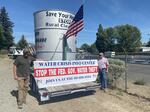
Grant Knoll, left, and Dan Nielsen, right, farmers protesting the federal government's response to drought in the Klamath Basin.
Holly Dillemuth / JPR
The U.S. Drought Monitor lists the Klamath Basin region in the two most intense categories of drought: “extreme” and “exceptional.”
In May, low water flowing into Upper Klamath Lake prompted water managers with the federal Bureau of Reclamation to cut the flow to irrigated farmland almost completely. And the water typically released down the Klamath River to ward off bacterial infections that are killing juvenile salmon was also cancelled.
U.S. Rep. Cliff Bentz, a Republican, represents Oregon’s 5th Congressional district and has proposed a $57 million disaster package focused on providing relief. He joined OPB’s “Morning Edition” host Geoff Norcross this week to talk about the crisis and potential solutions.
You can listen to the entire conversation using the audio player at the top of this story. Here are highlights:
Geoff Norcross: A few weeks ago you chaired the House Natural Resources Committee Republican Forum on Catastrophic Drought in the West. What did you learn about how the Klamath Basin compares to the rest of the West in terms of drought?
Rep. Cliff Bentz: Sadly, it’s very similar or worse than much of the West. There’s no doubt: about 70 million people across the Western United States suffering from drought. The Klamath just happens to be one of the very worst parts of that huge drought affected area.
Related: 5 things to know about the Klamath water crisis
Norcross: Your aid package would give money to farmers, wildlife refuges, water districts, fishermen and tribes — in that order. You were in the area last week. What did you hear from people about the most critical needs right now in the Klamath Basin?
Bentz: One of the most critical needs, of course, are the communities whose who are going to be effected and already are because the groundwater is dropping so fast, because people are of course turning to wells. And so the smaller cities are now running into difficulties supplying smaller towns around Klamath Falls with water. So that’s a huge challenge.
And of course, the farming community is dramatically affected. The tribes are dramatically affected. This is a very, very challenging situation for everyone.
Norcross: How did you decide how to prioritize the water and who gets what?
Bentz: Of course, I didn’t decide that, the nation kind of decided when it adopted the Endangered Species Act years ago. And under that, the nation has made a choice to put the water toward a single species, in this case, the shortnose sucker and other suckerfish located in Klamath Lake, and then some of the water will be released over the summer for the salmon further downstream. And that decision was made at the federal level, and that came along long after people had committed to establishing their lives and generations of families on farms and established communities. So that decision was not mine. The nation made it, and the nation should now try to figure out how it’s going to pay for the damage being done to those who relied on previous promises.
Norcross: Five years ago, water users throughout the Klamath basin came together in a compromise called the Klamath Basin Restoration Agreement. It was a huge effort, aimed at codifying water rights in the basin, but Congress failed to pass legislation that would have implemented it. Now that you’re in Congress, would you like to see another version of that agreement?
Bentz: I think that it’s incumbent upon the folks in that basin to figure out what they want to do it. You can’t come in from the top down in any of these situations. You’ve got to go to that basin and say, “How are we going to deal with this?” So yeah, there’s gonna have to be some getting together, as there was when that agreement was put together. That agreement did not have the support of the entire basin. It was very, very complicated and it was very, very expensive. That’s why it was not passed at the federal level. Any solutions can require a lot of money. But the most important thing is that everybody in that basin realized they’re all in it together.
Related: Irrigators say they plan to force open Klamath headgates and release water
Norcross: Two Klamath Basin farmers have led protests over these water restrictions and urged others to join them. They call these restrictions government overreach. What is your message to them?
Bentz: You said two farmers, and I do think there’s been very little support from the farming community for that approach. We all support the right to protest, protest all day long, but don’t step over the legal line. Please don’t.
Right now. I think everyone understands that this is a federal law that’s taking the water away from people who relied upon the federal government years ago to move into that basin. and we’re now looking to the federal government for the type of relief that’s necessary. And that’s what I’ve been saying down there over and over again: Let’s call out how incredibly damaging this decision to allocate all of the water to in-stream purposes is, and and let’s go get the money necessary to try to keep everybody from going bankrupt as we fight our way through this summer